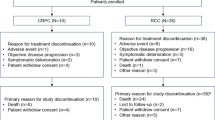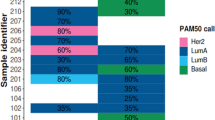Abstract
Purpose
Physiological and molecular findings indicate over-expression of HER proteins and dysregulation of neo-angiogenesis during progression of advanced prostate cancer. The aim of this study was to test a novel rational therapeutic approach by combining docetaxel with an EGFR-targeting agent (cetuximab) and with an anti-angiogenic agent (sunitinib, SUTENT®).
Methods
Mice bearing well-established PC3 prostate tumors (mean tumor volume/treatment group ∼250 mm3) were treated every week with vehicle alone (controls), sunitinib (40 mg/kg/day, 5 days/week for 3 weeks, 0.2 ml p.o.), cetuximab (0.2 mg/kg/day, 5 days/week for 3 weeks, 0.2 ml i.p.) and docetaxel (10 mg/kg, 1 day/week for 3 weeks, 0.2 ml i.p.).
Results
Each drug, administered as a single-agent, demonstrated comparable and moderate effects on tumor growth with approximately 50 % inhibition at the end of the 3-week dosing schedule. Computed combination ratio (CR) values for tumor growth determined on days 61, 68 and 75 after cell implantation indicated supra-additive effects for the sunitinib-docetaxel (1.53, 1.15 and 1.47, respectively) and sunitinib–cetuximab combinations (1.2, 1.32 and 1.14, respectively), and suggested additive effects only for the sunitinib–cetuximab–docetaxel combination (CR = 1). The effects on tumor growth were accompanied by a parallel diminution in tumor cell proliferation (Ki 67) and tumor vascularization (von Willebrandt factor). There were significantly higher pro-apoptotic effects (caspase-3 cleavage) observed for the sunitinib–docetaxel and sunitinib–docetaxel–cetuximab as compared to the other conditions.
Conclusion
The supra-additive anti-tumor effect observed with the sunitinib–docetaxel combination might support innovative strategies in the management of advanced prostate cancer.





Similar content being viewed by others
Explore related subjects
Discover the latest articles and news from researchers in related subjects, suggested using machine learning.References
Aalinkeel R, Nair MP, Sufrin G, et al (2004) Gene expression of angiogenic factors correlates with metastatic potential of prostate cancer cells. Cancer Res 64:5311–5321
Abrams TJ, Lee LB, Murray LJ, Pryer NK, Cherrington JM (2003) SU11248 inhibits KIT and platelet-derived growth factor receptor beta in preclinical models of human small cell lung cancer. Mol Cancer Ther 2:471–478
Amler LC, Agus DB, LeDuc C, et al (2000) Dysregulated expression of androgen-responsive and nonresponsive genes in the androgen-independent prostate cancer xenograft model CWR22-R1. Cancer Res 60:6134–6141
Bozec A, Lassalle S, Gugenheim J, et al (2006) Enhanced tumour antiangiogenic effects when combining gefitinib with the antivascular agent ZD6126. Br J Cancer 95:722–728
Canil CM, Tannock IF (2004) Is there a role for chemotherapy in prostate cancer? Br J Cancer 91:1005–1011
Canil CM, Moore MJ, Winquist E, et al (2005) Randomized phase II study of two doses of gefitinib in hormone-refractory prostate cancer: a trial of the National Cancer Institute of Canada-Clinical Trials Group. J Clin Oncol 23:455–460
Craft N, Shostak Y, Carey M, Sawyers CL (1999) A mechanism for hormone-independent prostate cancer through modulation of androgen receptor signaling by the HER-2/neu tyrosine kinase. Nat Med 5:280–285
Di Lorenzo G, Tortora G, D’Armiento FP, et al (2002) Expression of epidermal growth factor receptor correlates with disease relapse and progression to androgen-independence in human prostate cancer. Clin Cancer Res 8:3438–3444
Engels FK, Sparreboom A, Mathot RA, Verweij J (2005) Potential for improvement of docetaxel-based chemotherapy: a pharmacological review. Br J Cancer 93:173–177
Febbo PG, Richie JP, George DJ, et al (2005) Neoadjuvant docetaxel before radical prostatectomy in patients with high-risk localized prostate cancer. Clin Cancer Res 11:5233–5240
Festuccia C, Angelucci A, Gravina GL, et al (2005) Epidermal growth factor modulates prostate cancer cell invasiveness regulating urokinase-type plasminogen activator activity. EGF-receptor inhibition may prevent tumor cell dissemination. Thromb Haemost 93:964–975
Fischel JL, Ciccolini J, Formento P, Ferrero JM, Milano G (2006) Synergistic cytotoxic interaction in hormone refractory prostate cancer with the triple combination docetaxel-erlotinib and 5′DFUR. Experimental data. AntiCancer Drugs 17:807–813
Hurwitz H, Fehrenbacher L, Novotny W, et al (2004) Bevacizumab plus irinotecan, fluorouracil, and leucovorin for metastatic colorectal cancer. N Engl J Med 350:2335–2342
Jain RK (2001) Normalizing tumor vasculature with anti-angiogenic therapy: a new paradigm for combination therapy. Nat Med 7:987–989
Khan MA, Carducci MA, Partin AW (2003) The evolving role of docetaxel in the management of androgen-independent prostate cancer. J Urol 170:1709–1716
Kim SJ, Uehara H, Karashima T, Shepherd DL, Killion JJ, Fidler IJ (2003) Blockade of epidermal growth factor receptor signaling in tumor cells and tumor-associated endothelial cells for therapy of androgen-independent human prostate cancer growing in the bone of nude mice. Clin Cancer Res 9:1200–1210
Kim SJ, Uehara H, Yazici S, et al (2004) Simultaneous blockade of platelet-derived growth factor-receptor and epidermal growth factor-receptor signaling and systemic administration of paclitaxel as therapy for human prostate cancer metastasis in bone of nude mice. Cancer Res 64:4201–4208
Kim SJ, Uehara H, Yazici S, et al (2006) Targeting platelet-derived growth factor receptor on endothelial cells of multidrug-resistant prostate cancer. J Natl Cancer Inst 98:783–793
Lorusso PM (2003) Phase I studies of ZD1839 in patients with common solid tumors. Semin Oncol 30:21–29
Mendel DB, Laird AD, Xin X, et al (2003) In vivo antitumor activity of SU11248, a novel tyrosine kinase inhibitor targeting vascular endothelial growth factor and platelet derived growth factor receptors: determination of a pharmacokinetic/pharmacodynamic relationship. Clin Cancer Res 9:327–337
O’Farrell AM, Abrams TJ, Yuen HA, et al (2003a) SU11248 is a novel FLT3 tyrosine kinase inhibitor with potent activity in vitro and in vivo. Blood 101:3597–3605
O’Farrell AM, Foran JM, Fiedler W, et al (2003b) An innovative phase I clinical study demonstrates inhibition of FLT3 phosphorylation by SU11248 in acute myeloid leukemia patients. Clin Cancer Res 9:5465–5476
Perryman LA, Blair JM, Kingsley EA, et al (2006) Over-expression of p53 mutants in LNCaP cells alters tumor growth and angiogenesis in vivo. Biochem Biophys Res Commun 345:1207–1214
Petrylak DP (2005) Future directions in the treatment of androgen-independent prostate cancer. Urology 65:8–12
Pietras K, Hanahan D (2005) A multitargeted, metronomic, and maximum-tolerated dose “chemo-switch” regimen is antiangiogenic, producing objective responses and survival benefit in a mouse model of cancer. J Clin Oncol 23:939–952
Prewett MC, Hooper AT, Bassi R, et al (2002) Enhanced antitumor activity of anti-epidermal growth factor receptor monoclonal antibody IMC-C225 in combination with irinotecan (CPT-11) against human colorectal tumor xenografts. Clin Cancer Res 8:994–1003
Strohmeyer D, Strauss F, Rossing C, et al (2004) Expression of bFGF, VEGF and c-met and their correlation with microvessel density and progression in prostate carcinoma. Anticancer Res 24:1797–1804
Su B, Zheng Q, Vaughan MM, Bu Y, Gelman IH (2006) SSeCKS metastasis-suppressing activity in MatLyLu prostate cancer cells correlates with vascular endothelial growth factor inhibition. Cancer Res 66:5599–5607
SUTENT (sunitinib malate) (2006) Prescribing information. Pfizer Inc, New York
Tannock IF, de Wit R, Berry WR, et al (2004) Docetaxel plus prednisone or mitoxantrone plus prednisone for advanced prostate cancer. N Engl J Med 351:1502–12
Tonra JR, Deevi DS, Corcoran E, et al (2006) Synergistic antitumor effects of combined epidermal growth factor receptor and vascular endothelial growth factor receptor-2 targeted therapy. Clin Cancer Res 12:2197–207
Acknowledgment
PFIZER France is acknowledged for the financial support of this work.
Author information
Authors and Affiliations
Corresponding author
Rights and permissions
About this article
Cite this article
Guérin, O., Formento, P., Lo Nigro, C. et al. Supra-additive antitumor effect of sunitinib malate (SU11248, Sutent®) combined with docetaxel. A new therapeutic perspective in hormone refractory prostate cancer. J Cancer Res Clin Oncol 134, 51–57 (2008). https://doi.org/10.1007/s00432-007-0247-4
Received:
Accepted:
Published:
Issue Date:
DOI: https://doi.org/10.1007/s00432-007-0247-4




